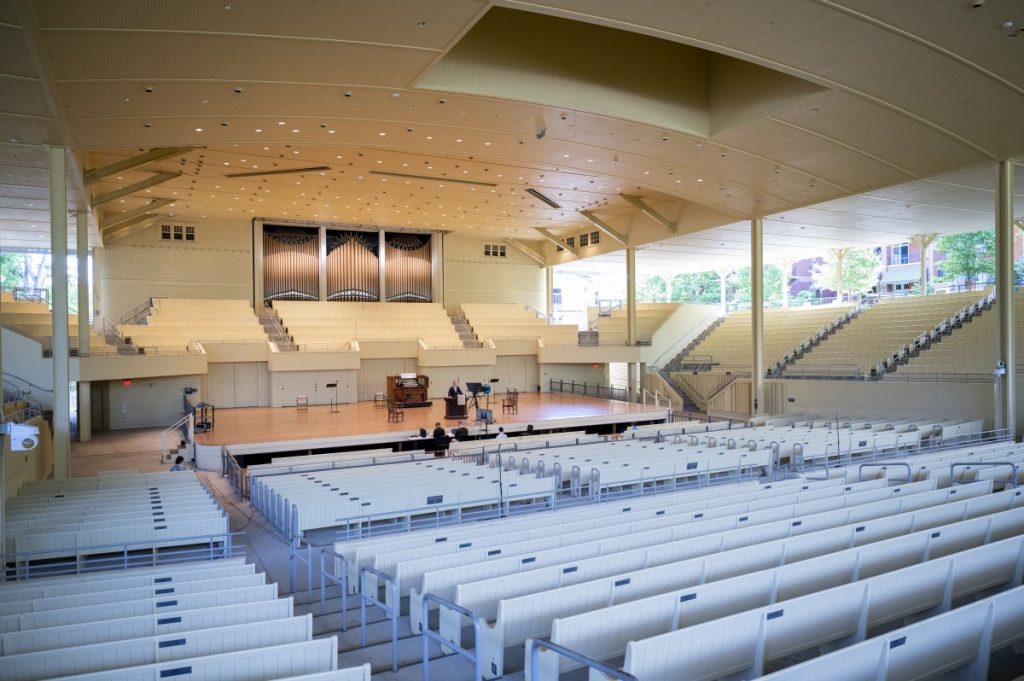
Editor’s note: These are the prepared remarks for Chautauqua Institution President
Michael E. Hill’s annual Three Taps of the Gavel address, delivered Sunday, June 28, 2020 in an empty Amphitheater as part of CHQ Assembly, prior to the beginning of the Service of Worship and Sermon.
“Good morning, and welcome home to Chautauqua.”
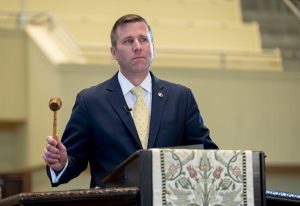
These are the words I have ordinarily used to open our assembly in the first four years I have been fortunate enough to serve as Chautauqua’s president. But this year is anything but ordinary. What you can’t see beyond me is an empty Amphitheater, which can seat up to 4,500 people. Our grounds in Western New York are traditionally populated with between 7,500 to 10,000 people on a day like this. My best estimates are that we have approximately 1,000 people on the grounds for the start of this season. From coast to coast, we are joined by people who are or have been locked in their homes or quarantining in far-off places due to COVID-19. And our nation is in week four of coast-to-coast protests for racial equality, and is facing anew questions about unhealed wounds that date back to our founding.
And yet, today, my “ordinary” greeting of “welcome home to Chautauqua” is still the right one, as we are welcoming you home to what our co-founder Bishop John Heyl Vincent called “the Chautauqua of ideas and inspirations, (which) is not dependent upon the literal and local Chautauqua.”
Tradition is important at Chautauqua. It’s the reason we’re here on this stage today, the same space from which almost every Assembly has been ushered in, and where we hold our principal worship services. Our traditions are replete with important symbols that tell stories about our history and our present role in the world and the yet untapped promise of our future. And symbols have been very much on my mind during this pandemic.
Today, from the opening three taps of a historic gavel, we usher in Chautauqua’s 147th Assembly. So much has happened in our world since the last time this gavel met the aged wood of this lectern, creating that haunting echo that portends the playing of the Largo on the great Massey Organ. This ritual of signifying the passage of time, the mourning of what must come to an end and the promise of something new emerging is a powerful metaphor for today.
And it is this “something new emerging” that makes me tremendously excited to gavel in this Assembly, perhaps one of the most important gatherings we have ever convened.
Tradition is important at Chautauqua. It’s the reason we’re here on this stage today, the same space from which almost every Assembly has been ushered in, and where we hold our principal worship services. Our traditions are replete with important symbols that tell stories about our history and our present role in the world and the yet untapped promise of our future. And symbols have been very much on my mind during this pandemic.
I have three items on top of my desk in the President’s Office at the Colonnade. One is a replica of a sign that sat atop the Resolute Desk in President John F. Kennedy’s White House. It reads “O, God, Thy sea is so great and my boat is so small.” The second is a stone square that former Chautauqua Vice President Marty Merkley gave me shortly after I began my tenure as the Institution’s 18th President. Inscribed in the rock is a quote from Franklin D. Roosevelt, who gave his famed “I Hate War” speech in this space. And the third is a 125-year-old rivet salvaged from a steel truss of the old Amphitheater, which was given to me when we opened up this revitalized Amphitheater at the start of my presidency in 2017. Each of these objects hold cues to the work that begins today and provides for us critical questions:
- What kind of vessel can Chautauqua be in these times of raging waters?
- Who are today’s prophetic voices that, like Roosevelt, serve as lanterns that light the way to the future we must create?
- And what is going to hold us together during this time and beyond if we are not only going to come out the other side of this crazy moment in history but come out a society that is better because we weathered the storm and learned from it?
These are the central questions of our 147th Assembly, and this is the journey we begin today.
What kind of vessel can Chautauqua be?
Ta-Nehisi Coates wrote in Between the World and Me, “My mother and father were always pushing me away from secondhand answers — even the answers they themselves believed. I don’t know that I have ever found any satisfactory answers of my own. But every time I ask it, the question is refined. That is the best of what the old heads meant when they spoke of being ‘politically conscious’ — as much a series of actions as a state of being, a constant questioning, questioning as ritual, questioning as exploration rather than the search for certainty.”
Chautauqua is asking itself an important question: How do we best serve a nation hungry for meaning and answers to complex questions at a time that feels so chaotic? As now-emeritus Kent State University President Beverly Warren asked us at Chautauqua in 2018, how do we “use the wound” to do something that will make our tomorrow a better one?
Today, we officially launch CHQ Assembly, a multi-platform online digital collective that will allow us to share all nine theme weeks of this summer assembly season, our featured lecture speakers, our chaplains of the week, our interfaith speakers, performing arts events, an impressive set of online master and enrichment classes, and a space for Chautauqua Visual Arts that allows people to view exhibitions, explore artwork, and shop in our Gallery Store. And all of that is only hinting at the hundreds of young performing and visual artists who will be studying with us online.
But CHQ Assembly is not a response to COVID-19, and it’s not a one-time initiative meant to bridge us to the other side of this pandemic. While it is certainly helping us to convene this summer, its inspiration comes from our strategic plan, 150 Forward, which asks us to consider how Chautauqua might have an impact beyond our traditional grounds in Western New York and beyond the traditional calendar of our summer assembly season. That plan also asks us to consider how we might harness the power of our platform to do even greater good in the world.
With this launch, we intend to be a part of a year-round dialogue and to use the power of CHQ Assembly, in partnership with others, to amplify voices in a needed national dialogue. We also hope that it allows us, perhaps for the first time in a significant way, to expand the reach of Chautauqua’s programming to audiences that have been for far too long missing from the Chautauqua mix. We seek to realize greater socioeconomic reach, to increase racial diversity and to remove financial and geographic boundaries that have kept our audiences too homogenous for too long.
As a respondent said in one of our community surveys last year, “What stands out for me is a promise that is not yet realized, which is inclusivity and becoming a place that demonstrates the values it espouses.” Those values:
- Passion for multigenerational and multidisciplinary engagement through the arts, education, recreation, and religion;
- Belief in the dignity and contributions of all people;
- Commitment to dialogue to achieve enhanced understanding that leads to positive action;
- Respect for the serenity, tradition, safety, and ecology of Chautauqua’s historic Grounds and surroundings; and
- Balance between Chautauqua’s heritage and the need to innovate.
… all come to rest in our new CHQ Assembly. We pledge today to provide a vessel for a more inclusive society to share what’s on its mind, to connect with one another and to remove the barriers that determine who gets to lead, or even be a part of, the conversation. It’s the opportunity to not only expand our programming reach, but more importantly to build a larger, more diverse community of fellow learners. When the community expands, the conversation changes, and the opportunity to learn grows. Chautauqua is the practice of humanity through forum, reflection and art, leading to thoughtful action, and this Assembly is inviting all — not some, but all — of the richness of humanity to play a part.
Who are today’s lanterns, lighting the way toward the future?
The murder of George Floyd on May 29 ignited worldwide protests against a racist and unjust system. Coming amidst the backdrop of a global pandemic, the world — and our country especially — has been flooded with renewed questions and calls for reform, for justice, for an end to some lives mattering while others seemingly do not. We enter this summer assembly, as Coates beckons us, needing “a constant questioning, questioning as ritual, questioning as exploration rather than the search for certainty.”
We need to explore:
- Our global and local response to climate change;
- Those unseen forces that are influencing the weaving and tearing of the fabric of our nation;
- The way in which art informs and has the potential to save our democracy;
- The ethical boundaries of our increasingly valuable and increasingly invasive technology;
- What we still have to learn from the suffrage movement in our ongoing fights for equality as we mark the 100th anniversary of women being granted the right to vote in this nation;
- How we rebuild our public education system and whether it can, as Horace Mann once noted, be “the great equalizer;”
- How notions of “us” and “we” can break through tribalism and isolation to help us bridge our differences;
- Whether the U.S. Constitution provides a pathway toward securing the “blessings of liberty” for us all and what may need to change to make that so; and
- What will the world look like over the coming decades, and how we can work together to better prepare for the future.
If Roosevelt used Chautauqua’s platform to remind the nation that we should hate war, we have an obligation to use this platform to give voice to those of this time that can show us a way forward, and I’m grateful to Christiana Figueres, Rabbi David Wolpe, Anna Deavere Smith, Darren Walker, Valarie Kaur, Sir Ken Robinson, Martha Jones, Jon Meacham, Angélique Kidjo, and Rhiannon Giddens, among many others, for being today’s lanterns.
What’s going to hold us together?
Many have questioned how we hold society together when we can’t even be within six feet of one another. Certainly, as an organization, as we shifted toward using CHQ Assembly as our main form of convening this summer, we asked ourselves questions about how to engage authentically when we have historically used the in-person gathering as one of our main ingredients — some might even say it’s the secret sauce of Chautauqua.
So what does it mean that for many Chautauquans this summer they will engage without leaving their homes or home communities? What does it look like to explore these important questions from the confines of our living rooms or on a remote device far from this Amphitheater or any of the other dozens of public gathering spaces on these grounds in Western New York?
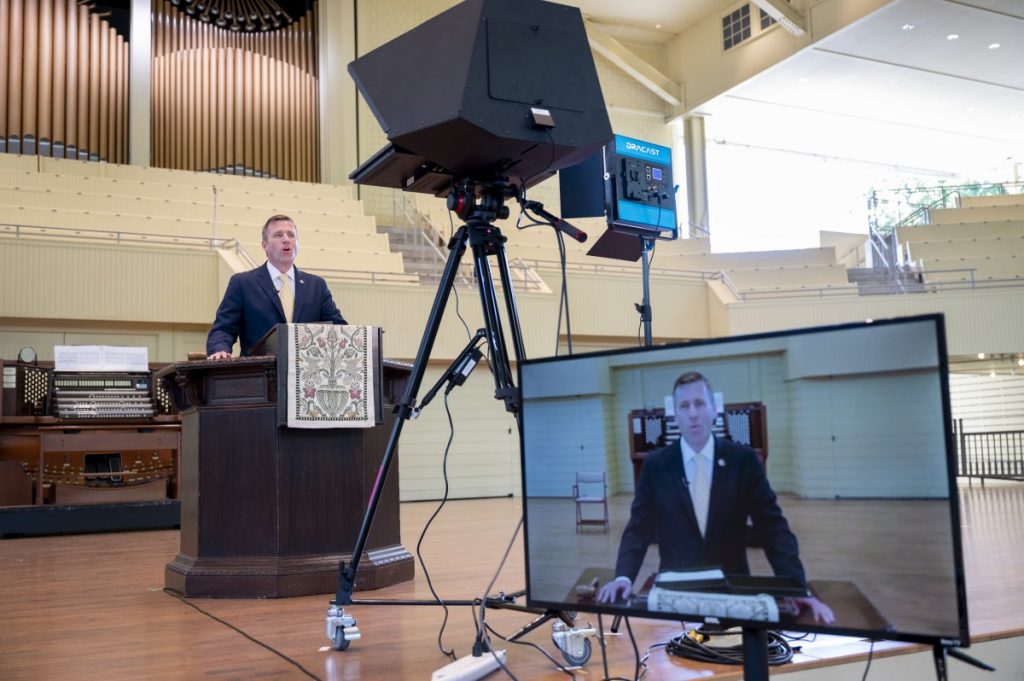
We often say when you come to Chautauqua that its power is not in the convening here, but in what you choose to do when you return home. Do you take all you’ve learned here and make a conscious choice to make your own corner of the planet a better place?
Coretta Scott King reminds us that “the greatness of a community is most accurately measured by the compassionate actions of its members.”
Given all that’s happening in the world, given the need for questions that demand exploration, not for certainty’s sake, but because we can and must come together, as we begin this new season, how can we take all we’re about to learn and devote our energies to do the work when our communities need it, need us, most?
This isn’t a “lost” summer, but a summer when we’re called to do more. The way we embrace fellow Chautauquans on the Plaza is how we should embrace those wherever we find ourselves this summer. This summer we don’t come to Chautauqua, but carry the spirit of Chautauqua throughout a world that needs it. And that spirit means opening ourselves up to learning, to declaring that “I have more work to do.” This summer must unite the name Chautauqua with the synonym of “active citizenry.” Because, when the world needs it most, we’re reminded that Chautauqua can, and must always be, far more than a place.
As I stare out into the Amphitheater today, there’s something powerful about knowing that while the benches may be empty, I look out into an amplified community, the heart of Chautauqua that gathers today to learn together, to worship together, and that makes a commitment to make the world a better place because of it.
That’s what those objects on my desk remind me of as we begin this assembly.
Yes, the sea is so great right now. But our charge is not to despair, but to be a vessel of hope.
Yes, the world sometimes feels as if it is at war. But we have modern-day prophets to serve as lanterns, showing us a way to a better tomorrow.
Yes, this tumultuous time has many feeling disjointed and insecure. But like that rivet that held our Amphitheater together, this Chautauqua ideal that was birthed almost 150 years ago was forged in harsh conditions. It has survived financial crises, societal upheaval, natural disasters and acts of terrorism. It can sustain the winds of a pandemic. We are anchored securely in our convictions to deploy the best in human values into the world.
When the rain has subsided, when the clouds roll away and reveal the sunrise of a new day, the daylight will show that Chautauquans never retreated, that Chautauqua never went away, not for even a minute. We found new ways when we were told the old ones were off-limits. We asked unrelenting questions, not always to reach answers, but to get closer to them. And we did that from all over the world, bringing the questions and a call to action to wherever we call home.
It is that exploration of humanity — with all its accomplishments and all its wounds – that commences at Chautauqua in this 147th Assembly. A pandemic could not keep us from that. Weeks of protests against injustice remind us we have too much important work left to do. So let’s get to it.
I tap the gavel three times …
Chautauqua 2020 has begun.


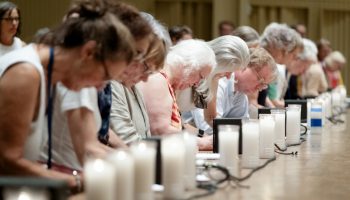
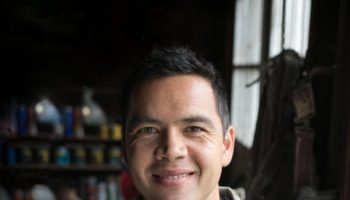
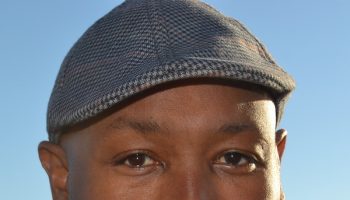
Not a dry eye in the house..beautifully said Michael and although our bodies are not at The Amp you are hardly alone. Each seat is filled with a Chautauquan Spirit..all you need to do is look with your heart and you will see us all.
Wishing you an important and powerful 147th Assembly and looking forward to a year ahead filled with good health and lasting peace. A year of great understanding and compassion for our fellow travelers. A year that enables and leads us to sit in full body before you for the 148th Assembly..A year we are all blessed with a renewed sense of courage and hope.
Best Dede Hirsch